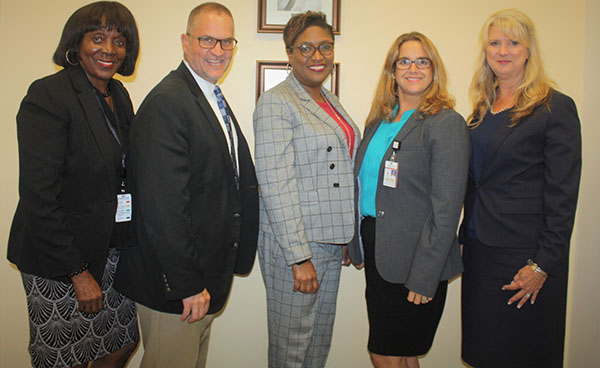
The Wellington Village Council adopted its budgets and assessment rates Tuesday, Aug. 13 for the Acme Improvement District, solid waste collection, the water and wastewater utility, and other special funds.
Director of Administrative & Financial Services Tanya Quickel provided a PowerPoint presentation on these portions of the village’s annual budget.
Quickel explained the breakdown of the budget for the Acme Improvement District, which oversees drainage and other utility activities in Wellington. She noted that there is no change to the annual non-ad valorem Acme assessment, which is staying at $230 per unit. Likewise, the non-ad valorem assessments for solid waste collection will hold steady at $135 for a curbside unit and $100 for a container unit.
Village Manager Paul Schofield noted that Wellington is taking action to keep the solid waste assessments as low as possible.
“The solid waste contract that we are being billed went up,” Schofield explained. “There are some reserves in that account, and we are using those to keep that rate stable for this year, and probably the next several years as well.”
The village’s water and wastewater utility rates are going up 3.5 percent, which includes annual indexing approved in last year’s rate resolution that resulted in an average household bill increase of $2.23.
Quickel explained that the budget for all of the funds and the revenues, including transfers-in, total $101.4 million, and expenditures and transfers-out total $106.2 million. “The difference between the revenues and the expenditures is that the expenditures are higher,” Quickel said. “We are using reserves to balance the budget, as planned. Even though the total budget is increasing, we had no increase in the millage and the non-ad valorem rates.”
While Wellington’s tax and assessment rates are not going up, residents could pay more than last year if the taxable value of their home increased.
The council also set the budgets for the Saddle Trail Park Neighborhood Improvement District and the Lake Wellington Professional Centre.
The Saddle Trail Park Neighborhood Improvement District Assessment, which is paid by Saddle Trail residents assessed for improvements in that neighborhood, is $1,720.54, which is based on property size and assessed annually for 15 years.
The Lake Wellington Professional Centre budget has an increase in revenues to $794,000 due to the annual cost of living increase in the leases for the tenants. The expenditures include the staffing of three full-time positions.
The Acme and enterprise budgets had revenues and transfers-in of $35.2 million and expenditures and transfers-out of $39.4 million using $4.5 million in reserves to balance the budget. These reserves come from the Acme Fund totaling $558,672, the Utility Capital Reserves totaling $3,128,601 and the Solid Waste Fund totaling $794,504.
Budget increases for the enterprise funds can be seen in utility debt service, which funds the $20 million in loans that were issued at the end of 2018 and the beginning of 2019. Utility capital projects include force-line improvements and lift station upgrades. Utility operations and technology increases are due to increases in chemical prices and increases in technology, like GIS services.
The five budget resolutions were adopted and approved by the council unanimously.
In other business:
• A presentation was given by newly appointed Central Region School Superintendent Valerie Zuloaga-Haines, who gave the council an update on the recently released school grades for the 2018-19 school year.
“For another year, the Village of Wellington’s schools are straight A, once again,” Zuloaga-Haines said. “The commitment you have in the Village of Wellington in supporting the schools shows in many different ways.”
Instructional Elementary Superintendent Vivian Green and Instructional Secondary Superintendent Karen Whetsell introduced new administrators at the elementary, middle and high school levels. Dana Pallaria is the new principal at New Horizons Elementary School, Donna Dekersky is the new assistant principal at Wellington Elementary School, Craig Corsentino is the new assistant principal at Polo Park Middle School and John Rejc is the new assistant principal at Wellington High School.
Zuloaga-Haines also thanked the village for its support of schools through the Keely Spinelli Grant Program, which directly benefits students in the lower 25 percent who struggle with reading and math.
“To move students in the lowest 25 percent is not an easy task,” Zuloaga-Haines said. “It is very difficult. We really believe that the Keely Spinelli grants are helping the efforts. The teachers and students are working very hard in school.”
The grant program allows Wellington schools to offer academic tutoring before, during and after school, Zuloaga-Haines explained.
School Board Member Marcia Andrews was also on hand to say a few words. “Our schools in Wellington are doing absolutely fantastic,” Andrews told the council. “It truly is because of our students, our community and our schools working together. The School District of Palm Beach County is thrilled to have the wonderful partnership with the Village of Wellington. The Keely Spinelli grants make a difference for our lowest 25 percent and just makes a difference for our schools in general. We have great teams of people in each of our schools because it takes an entire village.”
• The council presented a proclamation recognizing the Wellington Wolves Boys Basketball Team on winning the 2019 U14 Super 60 National Championship and the 2020 U15 Hoop Seen Best of the South National Championship. On hand to receive the proclamation were Elliot Greenstein, Keon Kindred, Jarvis Gulley, Langston Worthy, Raphael Brito, A.J. Gregory, Richardson Noncent, Brandon Walters, Zayin Humber, Brenden Williams, T.J. Williams, Hayden Eugene and Caleb Mackrey, along with head coach John Saint Juste, assistant coach Joshua Gregory and assistant coach King Kindred.
• The 2019-20 Community Development Block Grant Program action plan was adopted and approved, authorizing the village manager to provide the plan to the United States Department of Housing & Urban Development. The CDBG program makes available annual grants to states, counties and municipalities to develop viable urban communities by providing decent housing and a suitable living environment, and by expanding economic opportunities, principally for low-income and moderate-income residents.







